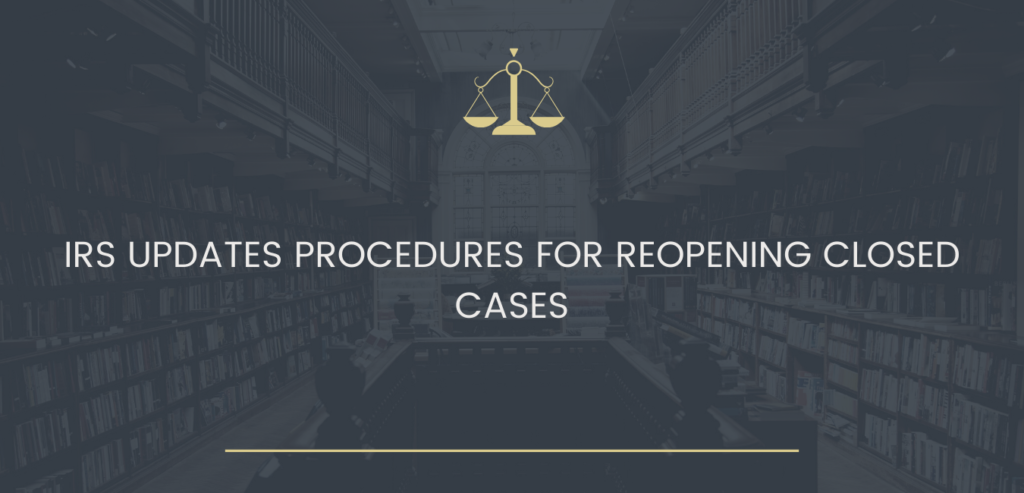IRS Updates Procedures for Reopening Closed Cases

IRS Updates Procedures for Reopening Closed Cases
IRS issued Rev. Proc. 2005-32
On May 20, 2005, the IRS issued Rev. Proc. 2005-32, which updates procedures for reopening closed examinations under §7605(b) and describes when a case is deemed closed after examination. It also provides a nonexclusive list of contacts and actions by the IRS that are not considered examinations, inspections, or reopening a closed court case; explains when a closed case may be reopened to make an adjustment unfavorable to the taxpayer, and the approval process required to reopen a closed examination. This revenue procedure modifies and supersedes Rev. Proc. 94-68 and is effective May 20, 2005.
An agreed case is considered closed after examination when the IRS sends written notification to the taxpayer of adjustments to the taxpayer’s liability or acceptance of the taxpayer’s tax return or exempt status without change. In a fully agreed case where the IRS and taxpayer enter into a closing agreement, the case is not closed until the closing agreement is signed by an appropriate IRS official.
Revenue Procedure
The revenue procedure provides four definitions for when an unagreed case is considered closed after examination. In the case of an unagreed income, estate, gift or chapters 41 through 44 excise tax case, or worker classification or plan qualification case subject to section 7436 or section 7476, it will be deemed closed when the period for filing a petition with the U.S. Tax Court expires with no petition filed. An unagreed TEFRA partnership case is considered closed when the time to bring an action in the U.S. Tax Court, a district court, or the U.S. Court of Federal Claims with respect to a Notice of Final Partnership Administrative Adjustment expires with no action filed.
Rev. Proc. 2005-32 defines the reopening of a closed case to involve the examination of a taxpayer’s liability which may result in an unfavorable adjustment to liability for the same taxable period as the closed case. It provides that the following four categories of contacts the IRS may make with a taxpayer are not considered examinations, inspections, or once an estate is closed can it be can a case be reopened after being closed reopenings:
IRS inspecting
Communications between the IRS and a taxpayer that does not involve the IRS inspecting the taxpayer’s books of account, such as: (1) looking at a tax return; (2) matching information on a tax return with, or preparing a missing return from, other records that are already in the IRS’s possession; or (3) considering any records voluntarily provided by the taxpayer to explain an error on a tax return or discrepancy.
Voluntary participation by a taxpayer in an IRS-administered issue resolution program that invites the IRS’s involvement with respect to one or more taxable periods earlier than under the IRS’s normal audit procedures. Examples of these programs include the Industry Issue Resolution and Pre-Filing Agreement programs.
Review of a taxable period previously examined or adjusted when the review arises from or is affected by the treatment of tax return items or transactions by the same taxpayer in a different (usually later) taxable period or by a related taxpayer in any taxable period. Examples include adjustments for a correction under section 1311 (mitigation rules) or a change to an item that was carried back which affects the liability for the carryback year.
Examination of a taxpayer or a third party for one purpose, tax, or period which results in the IRS obtaining information relevant or useful for a different purpose, tax, or period that may later be matched with a return or lead the IRS to later open an examination for that different purpose, tax, or period. Under the revenue procedure, the IRS may contact any person to determine whether that person is required to maintain a list under §6112 or to inspect the list required to be maintained or to verify the accuracy of or need for disclosure of a reportable transaction (or registration of a tax shelter) without that contact being considered an examination, inspection, or reopening with respect to any other party.
In general, the IRS will not reopen a closed case to make an unfavorable adjustment unless there was (1) fraud or misrepresentation of material facts, (2) a substantial error based on an established IRS position existing at the time of the examination, or (3) if a case is closed can it be reopened the case would be a serious administrative omission. However, Rev. Proc. 2005-32 also provides that if the IRS closed conducted and closed an examination that was limited to return items with a significant potential for abuse (which may include reportable transactions under §1.6011-4(b)) and later determines that other return items also merit examination, the IRS may reopen that examination.
If a reopening is sought, it must be approved in writing by the Territory Manager.
Rev. Proc. 2005-32 broadens the circumstances that permit the IRS to contact a taxpayer without that contact being considered an examination or case reopening. Furthermore, IRS warns taxpayers that the examples relating to contacts are not exhaustive or limitative and thereby reserves for itself a great deal of discretion in deciding when the reopening procedures must be followed.
If you have questions or need expert tax or family office advice that’s refreshingly objective (we never sell investments), please contact us or visit our Family office page or our website at www.GROCO.com. Unfortunately, we no longer give advice to other tax professionals gratis.
To receive our free newsletter, contact us here.
Subscribe our YouTube Channel for more updates.

Alan Olsen, is the Host of the American Dreams Show and the Managing Partner of GROCO.com. GROCO is a premier family office and tax advisory firm located in the San Francisco Bay area serving clients all over the world.
Alan L. Olsen, CPA, Wikipedia Bio

GROCO.com is a proud sponsor of The American Dreams Show.

The American Dreams show was the brainchild of Alan Olsen, CPA, MBA. It was originally created to fill a specific need; often inexperienced entrepreneurs lacked basic information about raising capital and how to successfully start a business. Alan sincerely wanted to respond to the many requests from aspiring entrepreneurs asking for the information and introductions they needed. But he had to find a way to help in which his venture capital clients and friends would not mind.
The American Dreams show became the solution, first as a radio show and now with YouTube videos as well. Always respectful of interview guest’s time, he’s able to give access to individuals information and inspiration previously inaccessible to the first-time entrepreneurs who need it most. They can listen to venture capitalists and successful business people explain first-hand, how they got to where they are, how to start a company, how to overcome challenges, how they see the future evolving, opportunities, work-life balance and so much more..
American Dreams discusses many topics from some of the world’s most successful individuals about their secrets to life’s success. Topics from guest have included:
Creating purpose in life / Building a foundation for their life / Solving problems / Finding fulfillment through philanthropy and service / Becoming self-reliant / Enhancing effective leadership / Balancing family and work…

MyPaths.com (Also sponsored by GROCO) provides free access to content and world-class entrepreneurs, influencers and thought leaders’ personal success stories. To help you find your path in life to true, sustainable success & happiness. It’s mission statement:
In an increasingly complex and difficult world, we hope to help you find your personal path in life and build a strong foundation by learning how others found success and happiness. True and sustainable success and happiness are different for each one of us but possible, often despite significant challenges. Our mission at MyPaths.com is to provide resources and firsthand accounts of how others found their paths in life, so you can do the same.
Your Successes Are More Important Than Your Failures
Your Successes Are More Important Than Your Failures If you look back on your life, whether it’s life in general or your career, or just about anything else, most likely you will remember the good times more than the bad. Of course, that doesn’t mean everything has gone perfect and that you haven’t had your share…
Clientele and Industries Served
Clientele and Industries Served In addition to serving over 1,200 individual tax clients, Greenstein, Rogoff, Olsen & Company, LLP serves companies in a wide range of industries. This listing presents the range of industries served by our firm. Industries Served: Our clientele span many industries and income brackets. High Technology Manufacturing Construction Hospitality Real Estate…
5 Ways to Successfully Network
5 Ways to Successfully Network Word of mouth is no longer the only networking option. As technology and the business world develop, so do networking opportunities. As consequence of our current recession, the recent rise of unemployment rates has caused many individuals to turn to more self-sufficient ways of making a living by starting their…
7 Tax Tips for Starting Your Own Business
7 Tax Tips for Starting Your Own Business Have you ever considered starting your own business? According to a recent survey, the rates of early-stage entrepreneurial activity surged in 2011, jumping nearly 60% in the U.S. More than 12% of U.S. adults reported starting a business or running new businesses last year. This is an…



